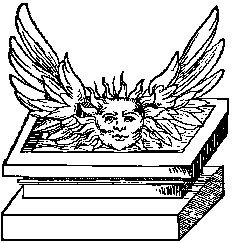rotting lips
When I die, bring my corpse to her,
And leave me there, or what of me remains.
If my love will kiss my rotting lips
And I should come to life, don't think it strange.
#64: From Rumi's Kolliyaat-e Shams-e Tabrizi
Search word: die
Last night I learned of the death of M. Scott Peck, so death and dying are on my thoughts still this morning. I was one of the many millions who read his main work, The Road Less Traveled, and I know it influenced my thinking and gave me some framework for understanding life. I especially loved a later travelogue he wrote, In Search of Stones, probably because it had resonances with my own life and a journey I once took with my father, searching out standing stones in Brittany.
Today's verse immediately brought to mind the images in the Rosarium philosophorum, a famous series of 20 alchemical woodcuts. An attractive coloured-in version can be found at Karen-Claire Voss' article on Spiritual Alchemy. Oddly, Plate 12 is missing in her series but appears below, courtesy of The Alchemy Web Site.

Plate 12 of the Rosarium philosophorum
@ The Alchemy Web Site (www.levity.com)
@ The Alchemy Web Site (www.levity.com)
In the plates preceding and following this image of a winged sun, a couple (sol and luna) are shown in sexual embrace or joined in a tomb. The culminating image of the series is a development, really, from the above plate. If that can be summarized as "out of the darkness, there comes light" then the resurrection of Christ is but a fuller human embodiment of that as "out of the despair of loss, injustice and humiliation, there comes resurrection and glorification".

Last plate of the Rosarium philosophorum
@ www.istanbul-yes-istanbul.co.uk
@ www.istanbul-yes-istanbul.co.uk
Commentary by Karen-Claire Voss:
Plate 20, the last image in the series, depicts the risen Christ. In his left hand he holds a banner marked with a cross; his right gestures toward the now empty sepulcher. That sepulcher unmistakably indicates that the completed alchemical process has involved the transmutation, not merely the transformation, and certainly not the transcendence, of the body. In the view of the alchemist who wrote the Rosarium philosophorum, the Christian doctrine of the resurrection of the body signified not the suppression, or even the transcendence, of the physical body, but its glorification and perfection. If the alchemical work necessitated the transcendence of the body, one would not expect to find an empty tomb, but a tomb filled with the putrefying remains of the king and queen. Instead, we see the risen Christ, the embodiment of the hierogamic union between human and divine. This last indicates a profound change in the subject/object relation since the divine is generally viewed as wholly other to the human.



2 Comments:
Hello Arisona! I am very impressed by your blog.I am from Northern Ireland, but I am russian-armenian. I am going to start new website about philosophy with the name "Rosarium philosophorum".We have very interesting standing stones in Donegol.I have been there.At the Glencolmcille place.I like Omar Khayyam poetry as well(the best about wine)
Best regards.Natali Abelian.
Hello Natali, I'm glad you liked my blog. I can see quite a few interests in common. :)
Do come back and post up the url to your new website when it's up.
Post a Comment
<< Home